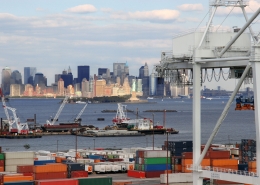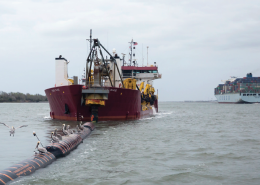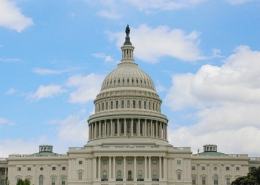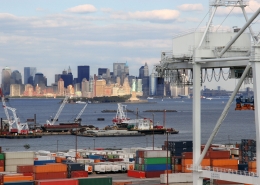Transit agencies across the country are grappling with daunting operating budget shortfalls caused by the depletion of COVID-19 federal relief funds, rising operating costs, and reduced fare revenues.
The gaps are enormous. For example, Chicago is facing a $730 million annual shortfall beginning in 2026.
Unless dramatic action is taken, some transit agencies could very well enter into a death spiral. That can happen if a transit agency reduces the frequency of its services. When transit service is less desirable, fewer people will use it — which could lead to a cycle of more service cuts, lower ridership, and even more budget cuts. This death spiral is not a theoretical concern; it played itself out all across the U.S. when many transit services were abandoned in the middle of the 20th century.
On November 8, Eno convened a panel to learn about how New York and Minnesota have responded to this fiscal cliff by raising taxes, while California and Illinois are taking concrete steps to address it. Four transit advocates shared how they have raised awareness and persuaded legislators to take dramatic actions to solve an urgent problem.
A recording of this panel, “Climbing Down from The Fiscal Cliff: Lessons from Transit Advocates,” will be available by the end of November at our webinar page.
Four Panelists
The backgrounds of the four transit advocates are different than most transportation industry professionals because they come from social advocacy backgrounds.
Eli Lipmen is the executive director of Move LA, a coalition-building nonprofit. He has organized successful transit campaigns (such as Measure M to increase the Los Angeles sales tax) as well as campaigns to create affordable housing, address homelessness, and improve California’s air quality. Danny Pearlstein is the policy and communications director at Riders Alliance, New York’s grassroots organization of subway and bus riders. He started advocating for better transit in high school and has worked as an attorney representing injured workers and low-income tenants.
Sam Rockwell is the executive director of Move Minnesota, a nonprofit organization that advocates for transit, biking, and pedestrian improvements. In 2001, he launched Move Minnesota Action, an organization that unlike its parent, can endorse candidates and conduct unlimited lobbying. In previous positions, Rockwell has worked with the Earth Institute, the World Wildlife Fund, and Transportation Alternatives. Amy Rynell is the executive director of Chicago’s Active Transportation Alliance, a non-profit organization whose vision is a thriving Chicago region abundant with walking, bicycling, and public transit options. She comes from a human service background and has led policy and innovation work in the areas of economic justice, criminal justice, and homelessness.
Ridership, Fares, and Mode
Transit agencies are facing different financial challenges depending upon ridership levels, reliance on fare revenue, and the mode of transportation (whether it be buses or trains.) A closer examination of the bleak financial landscape at San Francisco’s BART system illustrates the profound impact of these three factors.
Firstly, ridership plummeted on BART trains at the start of the pandemic and it is still at less than half of pre-COVID levels. The region’s employers have been flexible about allowing employees to work from home, contributing to this sustained reduction. According to the Census Bureau’s 2021 survey, about 18 percent of U.S. employees were primarily working from home, but it was about 35 percent in the Bay Area.
Secondly, BART has historically relied on fares to covers most of its operating expenses. Passenger fares and parking fees covered 66 percent of BART’s operating expenses in 2019, but these same revenue sources covered only 21 percent of operating expenses last year. This sharp decline highlights the vulnerability of transit agencies that are heavily reliant on fare revenue. Most transit agencies in the U.S. have traditionally been more dependent upon on local taxes to fund their operations. For example, before COVID, only 15 percent of LA Metro’s operating budget came from fares.
Thirdly, cutting service at BART would provide limited benefits because BART operates trains rather than buses. Reducing the frequency of train service does not lead to proportional cost savings because the expense of maintaining rail facilities would remain relatively constant. So, BART’s problems result from a triple threat: a rail system with high fixed costs, sluggish ridership, and a budget that is dependent upon fare revenues.
New York
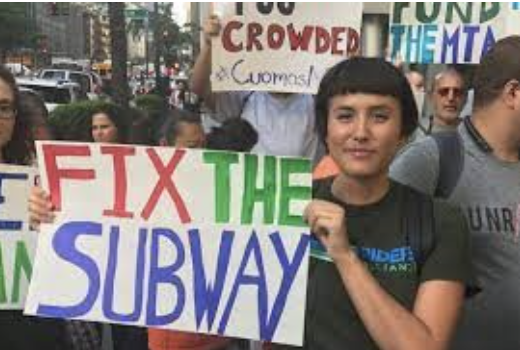
Our Story — Riders AllianceIn June, the New York State legislature and governor came to the rescue of the Metropolitan Transportation Authority (MTA).
The MTA, which operates the city’s subways and buses along with Metro-North Railroad and Long Island Rail Road, has long relied on a wide range of revenues including tolls and taxes on sales, fuel, property, and mortgages. A payroll tax is imposed on certain employers and self-employed individuals engaging in business within the MTA’s service territory. Four years ago, a tax on for-hire vehicle trips was also imposed.
Pearlstein said when the pandemic came in March 2020, the Riders Alliance began to work in earnest on emergency aid. Subway ridership which had approached 6 million per day was well below 500,000 per day. The Alliance developed close relationships with the New York congressional delegation including two very powerful ones: Chuck Schumer (the Senate minority leader at the time) and Rep. Hakeem Jeffries (the House minority leader).
Pearlstein said, “With the federal aid starting to dwindle in early 2023 and the MTA “looking into an abyss,” the Riders Alliance turned their attention to Albany. “We were able to work closely and successfully with the MTA and our key allies in the legislature who had chosen to make transit their number one issue” in the state budget.
The Alliance pushed for new sustainable funding sources not just to keep the existing service but to make it even better.
He said, “We have a base of thousands of active members. We have folks who we have worked very closely with on our issues, who we have cultivated into leaders.” He said the Riders Alliance also has strong allies in elected office, many of whom the Alliance worked with before they were elected. The Alliance lobbied the legislators in tandem with numerous other groups including immigrant rights organizations, social justice organizers, disability justice advocates, labor unions and others who “understand the importance of transit to their constituents and to the continued well-being of the city and region.”
“We worked with them all,” he said.
The most recent state budget included two changes to help the MTA’s bottom line. The payroll tax was increased from 0.34% to 0.6% and, it significantly reduced the number of employers who are exempted from paying it. The MTA was also provided enough resources to improve service. According to Pearlstein, where subways had been arriving every 12 minutes they are now scheduled to arrive every 8, and where they were operating every 8 minutes, they are now coming every 6.
“We didn’t get everything,” he said, but “we overperformed.”
California

In June, California’s governor, Gavin Newsom, signed the state’s budget bill while riding on a BART train. Although he had initially recommended cutting transit funds, the final budget provided additional funding so that the transit agencies could avoid any major service cuts for two years. The governor also signed legislation that establishes a Transit Transformation Task Force to develop policy recommendations for improving transit services and increasing transit ridership.
The head of LA Metro has relied upon the persistent work of Move LA and other local transit advocates to obtain funding and implement policies that improve transit reliability and speed. More than 40 miles of bus priority lanes have recently opened across Los Angeles with at least another 60 miles to be added by 2028. Metro Chief Operations Officer Conan Cheung recently thanked the advocacy community “for their leadership in sparking authentic discussions and building broad support for these transformational projects that bring equity and sustainability to the forefront.”
Move LA’s Eli Lipmen explained how transit advocates fought Newsom’s initial budget proposal that would have cut transit service. He said that Move LA helped form a state-wide coalition, Survive and Thrive, that was led by three Bay Area transit advocacy organizations (Seamless Bay Area, SPUR, and TransForm.) The coalition generated over 10,000 phone calls and emails to legislators, held dozens of meetings, and led rallies in San Francisco and Sacramento.
“We won,” Lipmen emphatically exclaimed.
But, transit advocates only enjoy brief celebrations before gearing up for their next battles. In the coming months, Lipmen wants to make sure that the state’s transit task force identifies abundant and sustainable resources for southern California’s transit agencies. Then, he and his coalition partners will lobby state legislators to enact the task force’s recommendations. If and when those funds start flowing, he will be closely monitoring the agencies to make sure that they use their new-found resources, wisely. The challenges facing transit advocates never end.
Minnesota
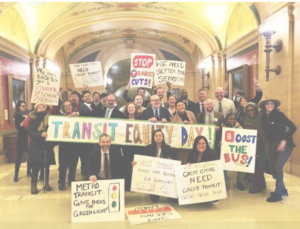 |
Move Minnesota advocates at the State Capitol |
In May, the governor of Minnesota signed a transportation bill into law which dedicates about $450 million annually in sales tax revenue to the transit operator in Minneapolis and Saint Paul, and provides funding for rail expansion programs. The new bill also ties the state’s gas tax to inflation.
Sam Rockwell’s group, Move Minnesota, along with a coalition of transit and environmental advocates had long advocated for transit improvements. They pushed hard for legislation after Democrats took control of both houses of the state legislature and the Democratic governor was re-elected in November 2022.
Rockwell said that years of advocacy paid off. Move Minnesota had been working with a coalition of over 50 partners including the Sierra Club, Union of Concerned Scientists, and the Rocky Mountain Institute. The advocates promoted changes to both transit and highway policies. One new law will require all highway expansion projects to be consistent with the state’s goals of reducing vehicle miles traveled and pollutants that cause climate change.
Rockwell said, “State lawmakers heard us loud and clear and came through in a big way” thanks to the volunteers who repeatedly showed up at the Capitol, and the residents who made their voices heard through emails, calls, and town halls.
The editor of Planetizen wrote about Move Minnesota’s success: “Seldom, if ever, does a bill adopted in the United States accomplish so many policy goals sought by transit and active transportation advocates in one legislative package.”
Illinois
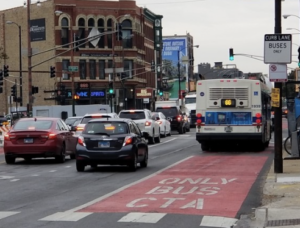 In the Chicago region, the three transit agencies (Chicago Transit Authority, Metra, and Pace) are facing an expected annual shortfall of approximately $730 million starting in 2026. To address this staggering gap, the region’s metropolitan planning organization, the Chicago Metropolitan Agency for Planning (CMAP), is submitting a Plan of Action to the Illinois state legislature.
In the Chicago region, the three transit agencies (Chicago Transit Authority, Metra, and Pace) are facing an expected annual shortfall of approximately $730 million starting in 2026. To address this staggering gap, the region’s metropolitan planning organization, the Chicago Metropolitan Agency for Planning (CMAP), is submitting a Plan of Action to the Illinois state legislature.
Amy Rynell of Chicago’s Active Transportation Alliance served as a co-chair of the plan’s Steering Committee which identified a range of funding options including using state funds to fully-fund paratransit operations, expanding the sales tax so that it would apply to services as well as goods, and generating new revenues from sources such as tolling, parking, and vehicle registration.
Rynell said that she is really proud of CMAP’s plan not only for addressing the fiscal cliff, but also because it brings together into one place recommendations that her organization has been hearing from riders and employers such as regional rail service, dial-a-ride, and speeding up bus services. She expects that getting a government agency to adopt these recommendations will give them a powerful impetus.
Rynell said “our fiscal cliff is looming” and “we know that not addressing it would be catastrophic.” She explained that her philosophy is very similar to the Riders Alliance approach in New York. “While the fiscal cliff is the catalyst for getting people to the table, we cannot simply fill the gap and continue with the system we have today. It’s a struggling system that’s not meeting many riders’ needs and meeting many employer needs.” She said, “We’re at a moment that’s really a rare opportunity to correct historic inequities.”
Rynell said the challenge that Illinois legislators now face “is a beast.” She explained that “revenue decisions in Illinois are fraught in the best of times and this brings in funding distribution, who gets what, governance, and system vitality. “
The advocacy community, she said, has been mobilizing and briefing legislators. “We have a set of champions who are ready to do this work more comprehensively than just the funding piece. But there’s a lot of work ahead.“
See fiscal cliff articles from previous editions of Eno Transportation Weekly
Chicago: Tackling the Fiscal Cliff and Addressing Governance Issues (October 2023)
WMATA Reveals Plans for Fiscal Cliff Doomsday Budget One Year from Now (June 2023)
New NYC Transit Forecast Previews “Fiscal Cliff” Issues (December 2022)
Looking to the Horizon: How Agencies are Anticipating the Mass Transit Fiscal Cliff (November 2022)
The Mass Transit Fiscal Cliff: Estimating the Size and Scope of the Problem (September 2022)








